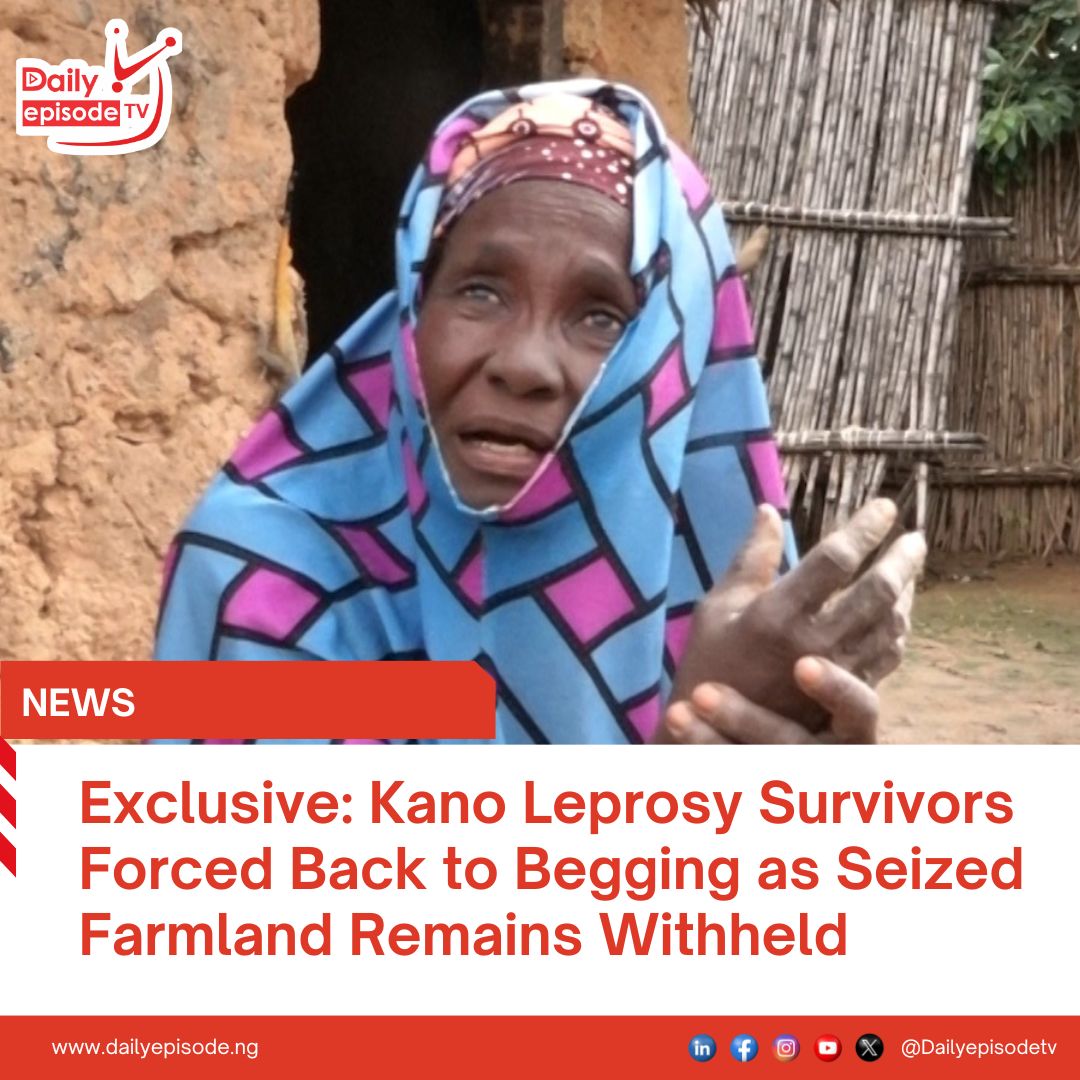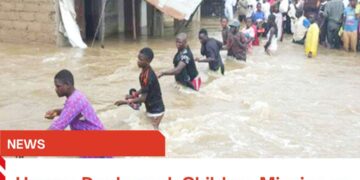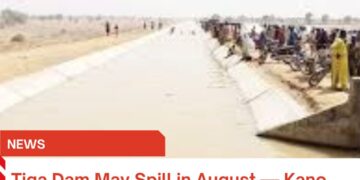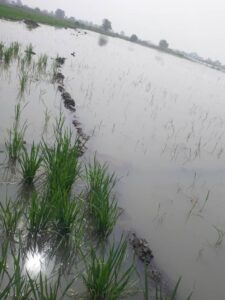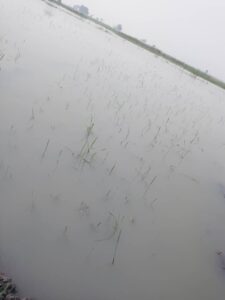Farmers in riverine communities are exposed to flooding whenever it rains or water is released from the Niger State Dam—Kainji and Jebba Hydropower Station. The farmers who purposely abandoned their rainy season farming still suffer double tragedy as torrential flooding submerged their billions of Naira rice plantation and sacked them from dry season farming in several villages across the state, YUNUSA UMAR of Daily Episode reports.
__________________________________
When Abubakar Yahaya Ketso abandoned his rice farm in September 2024 due to heavy flooding ravaging peasant farmers in riverine areas in Mokwa communities, he reserved his loan fund to resort to dry season farming to harvest bountiful rice, but his dream was never achieved, as torrential water released from Kainji and Jebba Hydropower stations destroyed their farm properties.
The young farmer, whose occupation in Ketso village is teaching and farming, was helpless when he spoke to Daily Episode. Mohammed is still bearing the scars of the torrent of floods released from the Niger State Hydro-Power Station that destroyed his rice farm, which was worth over a million naira.
According to him, “This is my eighth year since I began dry season farming, and it’s this unexpected flood that submerged my farm,” he snappily told Daily Episode.
The torrential flooding, which shattered the peasant farmers’ dreams of harvesting bountifully, lost in his thoughts. All his minimal effortsce farms were lost to water released by hydropower stations in Niger State, which left the farmers to bear the brunt of flooding.
“The sudden flooding has wiped out my rice farm worth millions of naira. 10 years back, I had already faced challenges due to seasonal flooding, which I had resorted to seasonal farming”
Ketso continues: “Unfortunately, the unexpected release of excess water has destroyed my farmland, leaving me in dire financial straits, especially as I relied on loans to fund my farming activities, including solar water pumps, fertilizers, agrochemicals, seeds, and other expenses.”
The farmer further urged the state government and hydropower companies to their aid, pleading that the flooding had subjected them to abject penury. “I’m appealing to the Niger State Government, the management of Mainstream Energy Solutions Limited the Kainji and Jebba dams, and the Hydro Power Producing Areas Development Commission (HYPADEC) for immediate intervention and support to recover from the disaster,” Ketso told Daily Episode.
In his apt tone, he said that it is a critical moment where coordinated action is needed to prevent further economic loss and hardship.
Several riverine communities, such as Dzangun, Kpashafu, Ekpegi, Ketso, Tada Maliki, Chiji, Kusogi, Zhiwu, Poto, Rabba, and others, were affected in the Mokwaokwa area of the state.
But that’s not all. Alhaji A. Musa, a once-prosperous farmer, suffered a similar fate as Ketso. A flash of water released from Jebba Dam had completely submerged his rice farm, which is worth over 7 million.
The farmer, who has relied on dry-season farming for over seventy years due to recurring floods that destroy their multi-million-naira crops, is now counting his losses once again, as a torrent of water released from the hydropower station has submerged his rice farm.

Last year, the farmer, who has been farming particularly in dry season farming for over 17 years, bagged 200 bountiful bags of rice, but he is unsure of reaching his target this year.
He narrated to Daily Episode, “We were not informed on the issue of the flood. In the middle of December, we made a nursing bed of rice and prepared the rice. We just saw floods without information from the dam, which happened at midnight.”
“In the morning, I was called when I got there, but my rice was flooded, including the livestock,” he added.
All the farmers in riverine areas are under siege from flooding, bearing the brunt of every perennial flood. Musa is not left alone; his 2 hectares of rice were completely submerged on a January night.
“I alone had spent more than 7 million on the Rice farm. This is the first time that we experienced dry season flooding.” We were surprised to see torrential water submerge our rice,” he said.
He further pleaded that the government should come to their aid to provide financial assistance to the farmers affected by this sudden flood.
Flash Flood Hits Katcha Communities
A flash flood released from Zungeru Dam similarly submerged rice plantations in the communities of Katcha and Gpapo. Epogi, Echegi, and Ega communities under Katcha LGA.
Daily Episode’s findings show that farmers’ crops were submerged without prior warning from all hydropower stations across the state, including Zungeru Dam.
One of the affected farmers, Salisu Abdullahi, is still grappling with annual floods ravaging his riverine area, including his village, Katcha. The 32-year-old farmer shared his experiences with Daily Episode, stating that the flood had completely submerged their food.
The farmers, particularly Abdullahi, are worried over the destruction of their rice farm worth millions of naira. His tale is not different from other farmers who shared that the destruction was not a natural occurrence.
“It happened last December to this moment. Everything is gone with the flood. This time not by raining but by human destruction,” he said snappily.
“In my about 2 hectares of farm, I have spent not less than a million naira on buying seeds, planting them, clearing the farm, laborers, herbicides for replanting, pesticides and fertilizer, and paying/feeding the farm guard,” Abdullahi told Daily Episode, lamenting that his crops worth millions of naira were destroyed.
He further told Daily Episode that his community and its riverine environs were never warned to prepare for flooding, stressing that nobody was warned before the release of water from the dam.
According to him, the government should know the effect of flooding and its consequences if water is released from the dam. “The government should do enough to provide relief for the people affected and take measures against the incompetent personnel in the dam.”
According to data released by UNICEF in 2022, flooding, which affected 34 out of the 36 states in the country, has displaced 1.3 million people. Over 600 people have lost their lives, and over 200,000 houses have either been partially or fully damaged.
The lack of proactiveness to mitigate flooding has left a ravaging mark on farmers’ faces, as many of them bear the scar of perennial flooding, which has forced them to abandon their rainy season farming.
“Flooding has already stopped almost all of us from farming in rainy seasons in our community, and this is the reason why everyone chooses dry season farming,” Abdullahi said, noting that the peasant farmers took loans from rice companies.

He narrated that rice companies gave them loans to farm and pay back with rice, explaining that the companies take them to court for failure to pay. He said, “The farmers who took out loans to farm rice are now in dire financial trouble, as rice companies would not listen to our plea. This is why our government needs to help us.”
The Commissioner of Agriculture, Alh. Musa Bawa Bosso confirmed that his ministry had sent a delegation to affected communities to ascertain the cause of the incident.
He said, “I sent a delegation that includes my permanent secretary and information officer to the areas. We have written a memo to the government. So we are waiting for his response so that they can be supported.”
He told our reporter that his team went to the affected area to ascertain what caused the incident.









